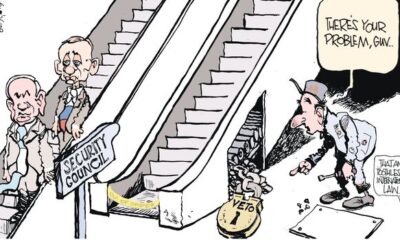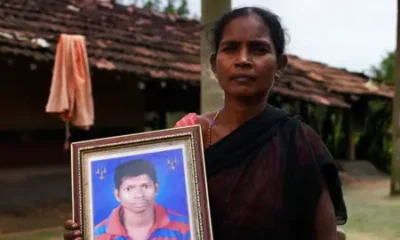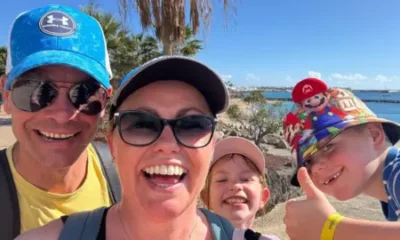Breaking News
Podcast: Rising authoritarianism, Kneecap and Eurovision

This post was originally published on this site.
An expert in international relations has told RTÉ’s Behind the Story podcast it is “extremely alarming” that Donald Trump has the full force of the US government behind him for another three years.
Alex Dukalskis, associate professor in the School of Politics and International Relations at UCD, said he believes the US is shifting “more into a dark place” under Mr Trump.
His co-written book – Dictating the Agenda: The Authoritarian Resurgence in World Politics – examines how authoritarian states have repurposed tools and norms, previously used to promote Western-backed liberalism, now turning them against liberal ideas.
Read more:
Trump backs Israel, warns Russia in combative UN speech
Prof Dukalskis said he believes the policies of Mr Trump are actually helping authoritarian regimes.
“It’s accelerating and we are shifting more into a dark place – it’s not completely hopeless [because] liberal democracy is still a very valued norm globally.
“I don’t think it’s hopeless but it’s certainly very alarming”.
‘Catastrophic mistakes’
Prof Dukalskis told David and Evelyn that when the Berlin Wall fell in 1989, the US had “disproportionate global power”.
“The most liberal democratic countries in the world at the time had something like 85% of global GDP – just a dominant status,” he explained.
“The US could at the time really advance the norms it preferred and, crucially, people saw it as a gold standard”.

Prof Dukalskis said a series of “catastrophic mistakes” – such as the invasion of Iraq and the 2010 economic crash – has seen alternatives appear.
“Around that time, you had these non-democratic states that were starting to pedal another model,” he said.
“Recall 2012 was around the time when Xi Jinping took power in China; so you had a new confidence that not only were authoritarian states rising in power, but they increasingly had a good story to tell about the decline of the west”.
Prof Dukalskis said the west’s attempt to draw China into the global economic system has had the opposite effect.
“There was an assumption that globalisation was going to socialise others to be like ‘us’.
“There was no thought given to the idea that the arrow could run in the other direction: that authoritarian states and actors could learn to use the interconnectedness of globalisation to exert points of leverage on liberal democratic societies,” he added.
David and Evelyn also discuss the dismissal of a terrorism charge against Kneecap rapper Mo Chara in the UK, as well as the logistics of an upcoming EBU vote on Israel’s participation in Eurovision.
You can listen to Behind the Story which is available on the RTÉ Radio Player.
You can also find episodes on Apple here, or on Spotify here.
Breaking News
Dating app sex assault victim urges others to seek immediate help
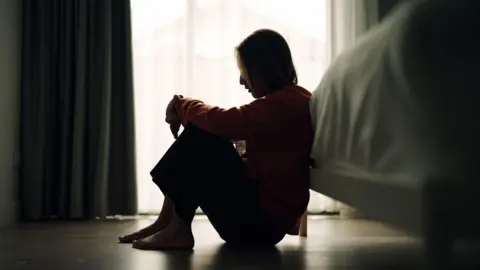
Read more on post.
Kevin SharkeyBBC News NI
A student who was sexually assaulted after meeting a man on a dating app has appealed to other survivors to seek immediate help to ensure there’s a record of the abuse.
The woman, who was 20 at the time, was attacked during a short-term relationship after she moved to Belfast to begin her university studies.
Last year, 25-year-old Fearghall Joseph Mulgrew, of Mullaghmoyle Road in Stewartstown, County Tyrone was jailed after pleading guilty to sexually and physically assaulting the woman.
Sophie, not her real name, believes her attendance at a sexual assault referral centre afterwards was crucial to the prosecution.
- Warning: Some readers may find parts of this article distressing
A judge at Belfast Crown Court said Mulgrew subjected the woman to a “degrading and frightening” experience, and he used her “as a sexual toy whose personal integrity and feelings were entirely subservient to your sexual desires”.
He was given a 22-month sentence in April 2024, serving 14 months on licence.
The court was told Mulgrew was a student in Belfast when he initially met the woman on the dating app Tinder in March 2021.
They agreed that the woman would come to his accommodation for “rough” intercourse at 03:00 GMT.
The woman said it was not something she had done before, but she agreed to try it, and the pair had consensual sex.
‘He wanted to do things his way’
The victim, who wishes to remain anonymous, has now spoken about her ordeal and explained that they had been in a casual relationship for about a month.
“The day of the incident he’d made it clear that he wanted to do things his way which included rough sexual contact. I hadn’t quite expected it to be what it was,” she told BBC News NI.
“He bit me, you know, in intimate areas where I had to kick him to get him off, to get him to stop, and even though we had a safe word he made it very obvious that that wasn’t even going to work, and he held my mouth closed with his teeth so I couldn’t say anything.
“That’s what sticks with me the most, the biting, it was all over my face.”
Reporting to police
Sophie, who has since left Northern Ireland, went to the Rowan sexual assault referral centre for help soon afterwards but she did not report the incident to the police until almost a year later.
She now believes her attendance at the centre was crucial to the subsequent prosecution of her abuser.
“I would advise that, even if you don’t know, because sometimes you can be so confused and so in shock that you don’t know but you think, then just get yourself looked at.
“For me, if I hadn’t gone to the Rowan, me reporting to the police would have been 100% more difficult. They wouldn’t have had my statement from the time, they wouldn’t have had photographs, and they wouldn’t have had all the swabs and things that they took.
“That evidence is invaluable especially if you are going into court,” she said.
 Reuters
ReutersHow are police tackling violence against women?
It has been three years since the Police Service of Northern Ireland (PSNI) launched an action plan to tackle violence against women and girls (VAWG).
The PSNI said it had made 5,042 arrests by the end of August 2025 under new legislation and conducted hundreds of targeted patrols.
They said they have also put in place four stalking protection orders using the new laws.
Each month, 84 arrests have been made on average for domestic abuse, there have been an average of 19 arrests each month for the offences of stalking, threatening and abusive behaviour, and 76 arrests each month for non-fatal strangulation.
In the 12 months to July 2025 there were 21,729 violence against women and girls (VAWG) offences recorded – a reduction of 4% compared to the previous 12 months.
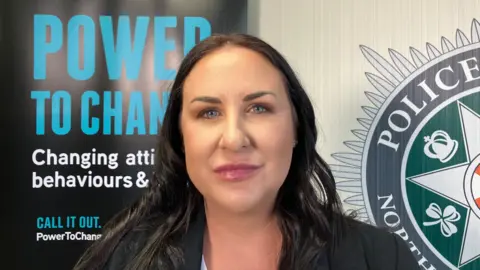
Det Ch Insp Leah Crothers, one of the PSNI’s tackling VAWG leads, said they “remain committed to doing everything” they can to prevent harm and call out unacceptable attitudes and behaviours.
“We have always been clear that it will take a societal effort to make a real change,” she added.
“Tackling violence against women and girls requires commitment from all — where perpetrators are held to account, communities stand together, and we work with partners to make every space safe. This remains our goal.”
Sophie said “too many men had blurred lines of consent and a misogynistic view on life”.
“I and so many other young women have suffered because of this. I am standing up to say it is not right and the only way to put a stop to it is to educate men and boys and for women like me to feel supported enough to report.”
If you are affected by domestic abuse, there is a range of support services available via the BBC’s Action Line page.
Breaking News
King and Queen set to meet Pope Leo in Vatican state visit

This post was originally published on this site.
The King and Queen will meet the new Pope during a state visit to Vatican City next month.
The couple will join Leo XIV, who was elected pope earlier this year after the death of Pope Francis, in late October to celebrate the 2025 jubilee year, Buckingham Palace said.
The Catholic Church typically marks a papal jubilee every 25 years.
Charles and Camilla‘s visit is expected to celebrate the ecumenical work by the Church of England and the Catholic Church, reflecting the Jubilee year’s theme of walking together as “Pilgrims of Hope”.
The King is Supreme Governor of the Church of England, a role which dates back to Henry VIII, who named himself Supreme Head of the Church of England after he was excommunicated by Pope Paul III and broke from the Catholic Church in the 16th century to marry Anne Boleyn.
The King and Queen had a meeting with Pope Francis just 12 days before he died.
Their historic state visit to the Vatican in early April was cancelled due to the then-pontiff’s poor health, but they managed to visit him privately during their trip to Italy.
The meeting with Francis, in what would be the final weeks of his life, was arranged at the last minute and took place on their 20th wedding anniversary on 9 April, with the pontiff wanting to personally wish them a happy anniversary.
Read more from Sky News:
Elon Musk and Prince Andrew named in latest Epstein files release
Watch moment diplomats walk out as Israeli PM speaks at UN
In an official message released following the news of Francis’s death on 21 April, the King said he and the Queen were “most deeply saddened”.
In May, Charles sent a private message to Pope Leo XIV congratulating him on his election, Buckingham Palace said.
Breaking News
Samaritans warned of volunteer exodus if plans to close branches go ahead

This post was originally published on this site.
Call handlers at the mental health helpline Samaritans are warning of a mass exodus of volunteers after the charity announced plans to close branches.
The ‘volunteer listeners’ say a shortage of people taking calls will lead to longer wait times to have them answered.
In July, Samaritans chief executive Julie Bentley said it was no longer sustainable to have so many branches.
In a video message to staff, seen by Sky News, she said: “Many of the branches we have today came into existence at a time when Samaritans was set up as a local service, providing separate local numbers. But that hasn’t been the case for some time.
“Our service today doesn’t need the number of buildings we currently have.”
Colm Martin, a volunteer listener for five years, said the announcement came “out of the blue”.
“We cannot make sense of it. This is supposed to be about improving a service and we can’t understand how closing half of all of the branches will improve the service or encourage more volunteers to come forward.”
Mr Martin says he thinks Samaritans will lose volunteers.
“Not because they want to leave, but because they’re forced out, because there isn’t a branch local to them that they can go to,” he said.
Last year, three million people called the Samaritans in need of support. Its website reads “every life lost to suicide is a tragedy”.
Read more from Sky News:
King and Queen set to meet Pope Leo
Hackers ‘behind nursery cyber attack’ reveal details of threat
Musk and Prince Andrew named in latest Epstein files release
About 23,000 trained volunteers work with the charity to listen and provide fast support to those experiencing suicidal thoughts as well as other mental health issues.
Ms Bentley told Sky News: “The improvements we’re proposing would mean callers getting through to Samaritans quicker while making it easier for anyone to join our amazing group of volunteers, regardless of their circumstances or busy lifestyles.
“Samaritans will continue to be there for those struggling to cope across the UK and Republic of Ireland, day and night, 365 days a year.”
Surbiton-based Angela remembers calling Samaritans for help 40 years ago when her father was dying of cancer.
“Whenever I reached out to any family member, they’d say ‘oh come on, you’re strong, you know what you’re doing. You’re a nurse’, she said.
“One night, I just reached an emotional limit. It was about two o’clock in the morning, and I thought ‘I’m going to burst here’.”
Angela says she cannot recall how long the call lasted but says it was answered quickly.
“He hardly spoke, he just let me empty all my thoughts and he listened,” she said. “That was so powerful to have someone just listening and not interrupting, not dismissing my feelings.”
The charity is set to vote on the proposed changes, which would take place over the next seven to 10 years, this weekend, although in Ireland the consultation process is not due to start until 2027.
Anyone feeling emotionally distressed or suicidal can call Samaritans for help on 116 123 or email jo@samaritans.org in the UK.
Alternatively, you can call Mind’s support line on 0300 102 1234, or NHS on 111.
-
Culture3 weeks ago
Life, loss, fame & family – the IFI Documentary Festival in focus
-
Politics4 days ago
European Parliament snubs Orbán with vote to shield Italian MEP from Hungarian arrest
-
Culture2 months ago
Fatal, flashy and indecent – the movies of Adrian Lyne revisited
-
Environment1 week ago
Key oceans treaty crosses threshold to come into force
-
Health4 days ago
EU renews support for WHO’s Universal Health Coverage Partnership
-
Culture4 days ago
Twilight at 20: the many afterlives of Stephenie Meyer’s vampires
-
Culture1 week ago
Farewell, Sundance – how Robert Redford changed cinema forever
-
Culture4 weeks ago
What is KPop Demon Hunters, and why is everyone talking about it?


